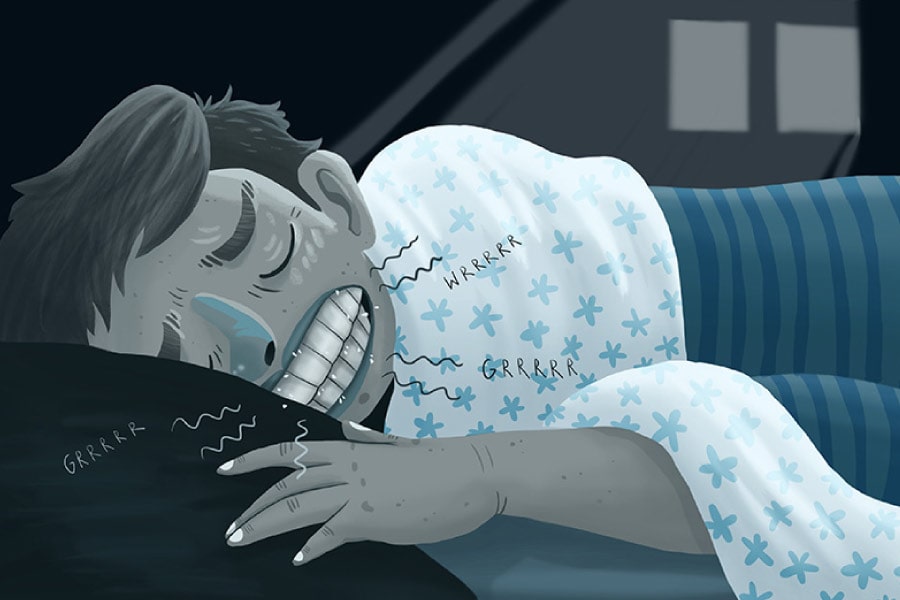What Is Bruxism (Teeth Grinding) and How to Protect Your Teeth

This article provides an overview of bruxism, commonly known as teeth grinding, and explores measures for protecting dental health.
It begins by discussing the causes of bruxism and highlights the signs and symptoms associated with teeth grinding.
The effects of bruxism on dental health are examined, followed by an exploration of methods for diagnosing this condition.
Additionally, the article outlines various treatment options for teeth grinding relief and emphasizes the importance of lifestyle changes to prevent bruxism.
Finally, dental care tips for individuals with bruxism are provided.
Key Takeaways
- Bruxism, or teeth grinding, can be caused by stress, anxiety, certain medications, bite or jaw abnormalities, sleep disorders, and malocclusion.
- Signs and symptoms of bruxism include clenching or grinding of teeth, tooth wear and damage, fractures and loss of enamel, temporomandibular joint disorders, muscle fatigue, and inflammation.
- Diagnosis of bruxism can be done through patient history, clinical examination, dental radiographs, electromyography, assessment of tooth wear, muscle tenderness, and jaw abnormalities.
- Treatment options for bruxism include stress management techniques, dental appliances like mouthguards, medication, behavioral therapies, and alternative therapies like acupuncture and chiropractic treatments. Night guards are effective in reducing tooth damage caused by bruxism, and their effectiveness may vary depending on the severity of the condition. Regular dental check-ups and proper maintenance of night guards are important for optimal effectiveness.
The Causes of Bruxism
The causes of bruxism can be attributed to various factors, including:
- Stress and anxiety: These psychological factors are commonly associated with bruxism. Individuals may unknowingly grind their teeth as a response to psychological tension.
- Certain medications: Some medications, such as antidepressants and stimulants, have been linked to an increased risk of bruxism.
- Abnormalities in the bite or jaw structure: Issues with the alignment or structure of the teeth and jaw can contribute to the development of bruxism.
Bruxism, or teeth grinding, is a parafunctional habit characterized by the involuntary clenching, grinding, or gnashing of teeth.
It is important to identify the underlying causes of bruxism in order to effectively manage and treat the condition.
Treatment options for bruxism may include:
- Stress management techniques: Learning and practicing stress management techniques can help reduce the occurrence of bruxism.
- Dental appliances: Dentists may recommend the use of dental appliances, such as a mouthguard, to protect the teeth from grinding during sleep.
- Medication: In some cases, medication may be prescribed to help relax the muscles and reduce grinding.
Signs and Symptoms of Teeth Grinding
This discussion will examine the causes of teeth grinding (bruxism) and explore the available treatment options for this condition.
Understanding the underlying causes of teeth grinding is crucial for effective treatment and prevention.
Additionally, exploring the various treatment options can provide individuals suffering from bruxism with the necessary information to make informed decisions about their oral health.
Causes of Teeth Grinding
One possible cause of teeth grinding is excessive stress or anxiety. This can lead to tension in the jaw muscles, resulting in the unconscious grinding or clenching of teeth. However, there are several other factors that can contribute to bruxism.
These include:
- Sleep disorders: Bruxism is commonly associated with sleep disorders such as sleep apnea or snoring.
- Malocclusion: Misalignment of the teeth or jaw can cause uneven pressure on the teeth, leading to grinding.
- Medications and substances: Certain medications, such as antidepressants or stimulants, can increase the risk of teeth grinding.
To prevent teeth grinding, it is important to address the underlying causes. Stress management techniques, such as relaxation exercises or therapy, can help reduce anxiety. Additionally, wearing a mouthguard at night can protect the teeth from damage caused by grinding.
Treatment Options for Bruxism
Treatment options for bruxism include:
- Behavioral therapies, such as biofeedback or cognitive-behavioral therapy, which aim to modify behaviors and thought patterns associated with teeth grinding. These therapies can help individuals become more aware of their teeth grinding habits and learn techniques to manage stress and anxiety, common triggers for bruxism.
- The use of mouthguards or splints, which can help protect the teeth and reduce the damage caused by grinding.
- Medications such as muscle relaxants or Botox injections may be prescribed to help relax the muscles involved in teeth grinding.
- Alternative therapies, such as acupuncture or chiropractic treatments, have also been explored as potential options for managing bruxism, although more research is needed to determine their effectiveness.
It is important to consult with a healthcare professional to determine the most appropriate treatment approach for bruxism, taking into consideration individual factors such as the severity of symptoms and the presence of TMJ disorders.
Understanding the Effects of Bruxism on Dental Health
Understanding the effects of bruxism on dental health necessitates an examination of the potential consequences of teeth grinding on the integrity and structure of the teeth. Bruxism, characterized by the clenching and grinding of teeth, is often associated with stress. The effects of stress on bruxism can exacerbate the condition, leading to increased tooth wear and damage.
The long-term consequences of teeth grinding can be significant, including tooth fractures, loss of tooth enamel, and temporomandibular joint disorders. These consequences can result in tooth sensitivity, pain, and difficulty in chewing. Moreover, the repeated mechanical forces exerted on the teeth during bruxism can cause muscle fatigue and inflammation in the surrounding tissues.
It is crucial to recognize and address the effects of bruxism on dental health to prevent further damage and promote oral well-being.
- Increased tooth wear and damage
- Tooth fractures and loss of enamel
- Temporomandibular joint disorders
Diagnosing Bruxism: How to Identify Teeth Grinding
A comprehensive approach to diagnosing bruxism involves analyzing patient history, conducting a thorough clinical examination, and utilizing adjunctive diagnostic tools such as dental radiographs and electromyography.
Patient history is important in identifying any symptoms or risk factors associated with bruxism, such as tooth sensitivity or a history of stress or anxiety.
A clinical examination allows for the assessment of tooth wear, muscle tenderness, and jaw abnormalities.
Dental radiographs can reveal any underlying dental issues that may be contributing to bruxism, such as malocclusions or missing teeth.
Electromyography measures the activity of the jaw muscles during sleep, providing valuable information about the presence and severity of bruxism.
Treating Bruxism: Options for Teeth Grinding Relief
This discussion will focus on the effectiveness of night guards in treating bruxism. Night guards have been widely used as a treatment for bruxism, but their effectiveness may vary depending on individual cases.
Another aspect to consider is the impact of lifestyle changes on reducing teeth grinding. Lifestyle changes, such as stress reduction and avoiding stimulating substances, can also play a role in managing bruxism.
In addition to night guards and lifestyle changes, there are various dental treatment options available for bruxism. Dental splints, which are custom-made devices that fit over the teeth, can help alleviate the symptoms of bruxism. Orthodontic correction may also be considered to address any underlying dental issues that may be contributing to bruxism. In some cases, medication may be prescribed to help relax the muscles and reduce teeth grinding.
Overall, the treatment approach for bruxism may vary depending on the severity of the condition and the individual’s specific needs. It is important to consult with a dental professional to determine the most appropriate treatment plan.
Night Guard Effectiveness
The effectiveness of night guards in preventing tooth damage caused by bruxism has been extensively studied in dental research. Night guards are oral appliances that are worn during sleep to protect the teeth from the harmful effects of teeth grinding. Research has shown that night guards can effectively reduce the impact of bruxism on tooth structure and prevent further damage.
However, it is important to note that the effectiveness of night guards can vary depending on various factors, such as the severity of bruxism and the quality of the night guard itself. To ensure optimal effectiveness, proper maintenance of night guards is essential. This includes regular cleaning and inspection for any signs of wear or damage.
In addition to night guards, there are alternative treatment options available for bruxism, such as behavior modification techniques and stress management strategies.
Lifestyle Changes Impact
Lifestyle changes can significantly influence the effectiveness of night guards in preventing tooth damage caused by bruxism. One key factor to consider is the impact of stress on bruxism prevention. High levels of stress have been associated with an increased risk of teeth grinding during sleep.
Therefore, individuals who experience high levels of stress should prioritize stress management techniques, such as exercise, relaxation exercises, and therapy, in order to reduce the occurrence of bruxism and enhance the effectiveness of night guards.
Additionally, adopting a healthy lifestyle can also contribute to bruxism prevention. Regular exercise, a balanced diet, and adequate sleep can all help to reduce the likelihood of teeth grinding.
Dental Treatment Options
Dental treatment options for managing tooth damage caused by bruxism include the use of night guards, occlusal splints, and orthodontic appliances.
Night guards are dental devices that are worn during sleep to protect the teeth from grinding and clenching. They act as a barrier between the upper and lower teeth, preventing them from coming into direct contact and minimizing the damage caused by bruxism.
Occlusal splints, also known as bite guards, are similar to night guards but are designed to be worn during the day as well. They help to redistribute the forces of grinding and clenching, relieving pressure on the teeth and jaw joints.
Orthodontic appliances, such as braces or aligners, may be recommended to correct any underlying bite or alignment issues that contribute to bruxism.
Alternative therapies, such as biofeedback and relaxation techniques, may also be explored to manage bruxism.
Lifestyle Changes to Prevent Bruxism and Protect Your Teeth
One effective approach to preventing bruxism and safeguarding teeth involves implementing modifications to one’s daily routine. Stress management and sleep hygiene are essential factors in maintaining dental health and preventing teeth grinding. By effectively managing stress levels, individuals can reduce the likelihood of bruxism episodes. Incorporating stress reduction techniques such as mindfulness meditation, exercise, and relaxation exercises can help alleviate tension and promote overall well-being. Additionally, maintaining good sleep hygiene, which includes establishing a regular sleep schedule, creating a conducive sleep environment, and practicing relaxation techniques before bedtime, can also contribute to preventing teeth grinding during sleep. By prioritizing stress management and sleep hygiene, individuals can take proactive measures to protect their teeth from the detrimental effects of bruxism.
| Stress Management | Sleep Hygiene |
|---|---|
| Mindfulness meditation | Regular sleep schedule |
| Exercise | Conducive sleep environment |
| Relaxation exercises | Relaxation techniques before sleep |
Dental Care Tips for Bruxism Patients
Implementing appropriate oral hygiene practices and seeking regular dental check-ups are crucial for individuals with bruxism to effectively manage their condition and ensure the overall health of their oral cavity.
There are additional dental care tips that can be beneficial for bruxism patients in managing their teeth grinding and protecting their teeth. These tips include:
- Using dental splints or mouth guards: Dental splints can help protect the teeth from the clenching and grinding forces associated with bruxism.
- Practicing relaxation techniques: Stress and anxiety can worsen bruxism, so incorporating relaxation techniques such as deep breathing exercises or meditation can help reduce these factors and alleviate symptoms.
- Avoiding hard or chewy foods: Consuming foods that require excessive chewing can exacerbate bruxism symptoms, so it is advisable to avoid such foods.
Frequently Asked Questions
Can Bruxism Cause Damage to the Jaw or Temporomandibular Joint (Tmj)?
Bruxism, or teeth grinding, can lead to damage in the jaw and temporomandibular joint (TMJ). The excessive force exerted during grinding can cause pain, inflammation, and dysfunction in the TMJ, affecting jaw movement and overall oral health.
Are There Any Home Remedies or Natural Treatments for Bruxism?
Home remedies for bruxism and natural treatments for teeth grinding are sought after by individuals experiencing this condition. While there is limited scientific evidence supporting their effectiveness, options such as stress reduction techniques and relaxation exercises may be considered.
Can Stress or Anxiety Be a Contributing Factor to Teeth Grinding?
Stress and anxiety have been suggested as potential contributing factors to teeth grinding. Stress management techniques, such as relaxation exercises and cognitive-behavioral therapy, as well as the use of dental night guards, may help alleviate symptoms associated with bruxism.
Is There a Connection Between Bruxism and Sleep Disorders Such as Sleep Apnea?
The connection between bruxism and sleep disorders such as sleep apnea has been investigated. Research suggests that bruxism may negatively impact sleep quality, and untreated bruxism can have detrimental effects on overall dental health.
Can Children Suffer From Bruxism, and if So, How Is It Different From Adult Teeth Grinding?
Children can suffer from bruxism, a condition characterized by teeth grinding. The effects of bruxism on children’s teeth differ from those in adults. Understanding these differences is important for effective management and prevention strategies.









